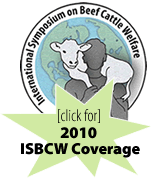
2010 ISBCW Coverage:
Adopting Industry Guidelines
for Animal Welfare
Using the same approach to cattle well-being as to beef quality assurance
will allow producers to meet animal welfare goals without regulation.

Bob Smith emphasized the importance of adopting industry guidelines — such as Beef Quality Assurance (BQA) practices — through the entire beef production chain as he addressed participants of the International Symposium on Beef Cattle Welfare (ISBCW) May 19. Smith, who is a veterinarian based in Stillwater, Okla., works in private practice with five other veterinarians at Veterinary Research and Consulting Services. The group works with feedlot and stocker cattle clients across the High Plains.
Smith reminded attendees that one of the core BQA values is the belief that production practices affect consumer acceptance of beef. He added, "Producers can make a difference in the beef that is produced by taking responsibility and working together." Read more.
2010 ISBCW Coverage:
Benchmarking Animal Welfare Progress
When encouraging those in the beef industry to make changes
to improve animal well-being, measured outcomes can provide the reason why.
Dan Thomson, professor and director of the Beef Cattle Institute (BCI) at Kansas State University (K-State), posed the question, "Why do we need to measure outcomes?" as he addressed the International Symposium on Beef Cattle Welfare (ISBCW) May 20 on the K-State campus.
Thomson replied, "Because when you are asking people to make changes, they are going to ask, 'Why?' " Having measured outcomes can give a basis for the animal well-being recommendations that are made. Read more.


Wes Tiemann
Association Perspective
Selling cattle by the pound or a price per pound?
"I don't get paid for carcass traits," is a quote I often hear traveling the country. This is really no shock when most cow-calf producers sell weaned calves and get paid for the weight of the animal across the scale. This is a practice that has been done for several generations. It has certainly served a great purpose in price discovery in cattle and still does today. At the same time, it has perhaps propagated a disconnect in the beef industry between the cow-calf producer and the consumer. Read more.
Sustainable Technology to Feed the World
A question must be understood before it can be answered. Meat industry leaders kept that in mind as they looked at consumer concerns regarding technology, sustainability and food choices last month.
The session on “Technology: Handling the Food Demands of a Growing World,” was in conjunction with the annual Reciprocal Meat Conference June 23 in Lubbock, Texas. Elanco Animal Health, the American Meat Science Association and Certified Angus Beef LLC (CAB) were hosts. Read more.

What’s Inside …
In this July edition of the Angus Beef Bulletin EXTRA, you'll find valuable articles devoted to the management, marketing, and health and nutrition of your beef enterprise. Select from the tabs at the top of the page to access this month's entire offering by category. A few select features include:
• Profitability Calls For
Efficient Forage Production
• Beef Cattle Welfare Considerations on
Cow-Calf Operations
• Find and Treat Foot Rot Early
News Briefs …
The American Angus Association and its subsidiaries generate a wealth of information to keep members and affiliates informed of what's happening within the industry as well as with the programs and services they offer. Click here for easy access to a summary of recent news and links to the newsrooms of the American Angus Association and Certified Angus Beef LLC and the Angus e-List archive.

Up for an Emmy
Temple Grandin HBO movie receives 15 Emmy nominations.
An HBO movie, which aired last February, illustrating the life story of Temple Grandin, Colorado State University (CSU) animal scientist and renowned animal behaviorist has received 15 Primetime Emmy Award nominations. Entitled Temple Grandin, the film chronicles her perseverance while struggling with autism.
Among the nominations that the film received are those for Best Made for Television Movie, Lead Actress in a Miniseries or Movie (Claire Danes), Supporting Actor in a Miniseries or Movie (David Strathairn), Supporting Actress in a Miniseries or Movie (Julia Ormond and Catherine O'Hara) and Directing for a Miniseries, Movie or a Dramatic Special (Mick Jackson). Read more.

Vitamin D and Mental Agility in Elders
At a time when consumer interest in health-enhancing foods is high, Agricultural Research Service (ARS)-funded scientists have contributed to a limited but growing body of evidence of a link between vitamin D and cognitive function.
Cognitive function is measured by the level at which the brain is able to manage and use available information for activities of daily life. Alzheimer's disease, the most common form of age-related dementia, affects about 47% of adults aged 85 years or older in the United States. Identifying nutritional factors that lower cognitive dysfunction and help preserve independent living provides economic and public health benefits, according to the authors.
The study, which was supported by ARS, the National Institutes of Health (NIH) and others, was led by epidemiologist Katherine Tucker with the Jean Mayer USDA Human Nutrition Research Center on Aging (HNRCA) at Tufts University in Boston, Mass. Tucker collaborated with HNRCA laboratory directors Irwin Rosenberg, Bess Dawson-Hughes and colleagues.
Metabolic pathways for vitamin D have been found in the hippocampus and cerebellum areas of the brain involved in planning, processing, and forming new memories. This suggests that vitamin D may be implicated in cognitive processes.
The study involved more than 1,000 participants receiving home care. The researchers evaluated associations between measured vitamin D blood concentrations and neuropsychological tests. Elders requiring home care have a higher risk of not getting enough vitamin D because of limited sunlight exposure and other factors.
The participants, ages 65 to 99 years, were grouped by their vitamin D status, which was categorized as deficient, insufficient or sufficient. Only 35% had sufficient vitamin D blood levels. They had better cognitive performance on the tests than those in the deficient and insufficient categories, particularly on measures of "executive performance," such as cognitive flexibility, perceptual complexity and reasoning. The associations persisted after taking into consideration other variables that could also affect cognitive performance.
The 2009 study appears in the Journals of Gerontology, Series A, Biological Sciences and Medical Sciences.
[Click here to go to the top of the page.]







